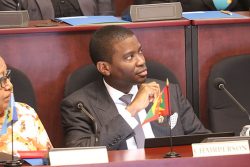It transpires that People’s Progressive Party stalwarts and former government ministers Harry Persaud Nokta and Clinton Collymore are employed in the Ministry of Local Government and Regional Development, the same ministry in which they both served as ministers, since 2007. This comes as no great surprise. Other former ministers including the now deceased Reepu Daman Persaud, Navin Chanderpal, Gail Teixeira and Shaik Baksh all served as ministers before – in the cases of Persaud, Chandarpal and Teixeira – being appointed presidential advisors. Baksh, who was replaced as Education Minister when President Ramotar took office at the end of 2011 was subsequently given another job paid for by the state in the water sector. Other PPP party members have turned up in other positions paid for with taxpayers’ money.
It is worth mentioning that in the vast majority of cases these jobs pay salaries that are significantly larger than those paid to most public servants, even the senior ones. We learnt that former ministers Nokta and Collymore both earn upwards of $300,000 per month apart from which they each get a maid, a gardener and transportation ‒ all paid for by the state. That is about as much as we know about these advisory appointments and we have the new culture of some measure of accountability to which the present parliamentary opposition subjects the other side of the House to thank for that.
The appointees serve at the pleasure of the political administration which does not usually make public these appointments or divulge any information regarding the responsibilities that attend them.
There is something unwholesome about the procedures and practices that attend these appointments. It is like playing monopoly with the public purse. This is not to say that the government does not need advisors. It is the facility with which former ministers are simply recycled into these advisory positions that is bothersome. The practice suggests that the administration has made considerable elbow room for nepotism, providing jobs for the party faithful at the state’s expense and, moreover, as mentioned above, at rates of pay that are significantly superior to those earned by most public servants.
The manner in which the practice is pursued is also decidedly galling. It is attended by what appears to be contempt. It appears that the only ‘procedure’ that dictates the process of appointing advisors is the discretion of the political administration, an approach that bespeaks a particularly odious form of official lawlessness.
We have the enhanced transparency that now obtains in the present dispensation of the National Assembly to thank for the revelations regarding some of the details of the ‘contracts’ enjoyed by Messrs Nokta and Collymore. That, however, ought not to be the end of the matter. Surely, we need to ensure that these advisory appointments are brought under some umbrella of accountability that begins with requiring from the government an across-the-board disclosure on these and various other ‘contractual’ appointments that it has made over time so that they can be evaluated and justified. This, it would seem, is the ideal opportunity to infuse a greater measure of accountability into government.
There are good reasons for these recommendations. First, the PPP/Civic administration has demonstrated a proclivity for nepotism, the allocation of advisory positions to former ministers being but a single manifestation of the propensity; so that even if there may be cases in which an advisory appointment is justified, on the whole, we have no persuasive evidence that the practice is not simply ‘a jobs for the boys scheme’ intended to provide former PPP/C ministers and other high officials with what is commonly referred to as ‘conditions no less favourable’ after they cease to be ministers. In the case of the late Reepu Daman Persaud, for example, it is worth wondering whether his protracted period of illness would not have significantly reduced his capacity to continue to serve as a Presidential Advisor long before his eventual demise, and ought not to have made a case for him being relieved of the title some time ago.
The second important reason why we need checks and balances in the matter of these advisory appointments is to help to put a brake on the practice of the disbursement of public funds in a manner that sometimes appears to lack any serious justification beyond some political say-so. There is a desperate need to remove the unfortunate perception almost certainly harboured by many, perhaps even most Guyanese, that the most valued perk of securing political power is the control of the public purse which it facilitates.
It would be both ill-advised and morally wrong to simply allow for the swelling of the ranks of ministers-turned-advisors at substantial salaries in circumstances where, for more years than we care to remember, nothing has been done about affording public servants anything in the way of salary increases beyond the humiliatingly modest annual handouts that they receive.
Here, it is worth mentioning that the PPP/C administration has actually ‘crowded’ a fair section of the traditional public service with consultants of its choosing, some of whose appointments and credentials we have no knowledge. Exactly what they do to earn the tax dollars that they are paid is, in most cases known only to themselves and their benefactors.
Sidelined or retired ministers of government ought not to be afforded unjustified ‘second spring’ job opportunities ahead of increasing the salaries of qualified engineers and various other categories of public servants whose take home pay does not, in most instances, amount to half of what former ministers receive in their advisory positions. No less disturbing is the practice of providing what so often bears a suspicious resemblance to retirement benefits for our ministers turned advisors in circumstances where government can hardly guarantee the hundreds of hopeful UG graduates and undergraduates suitable employment. It is a travesty, no less.





